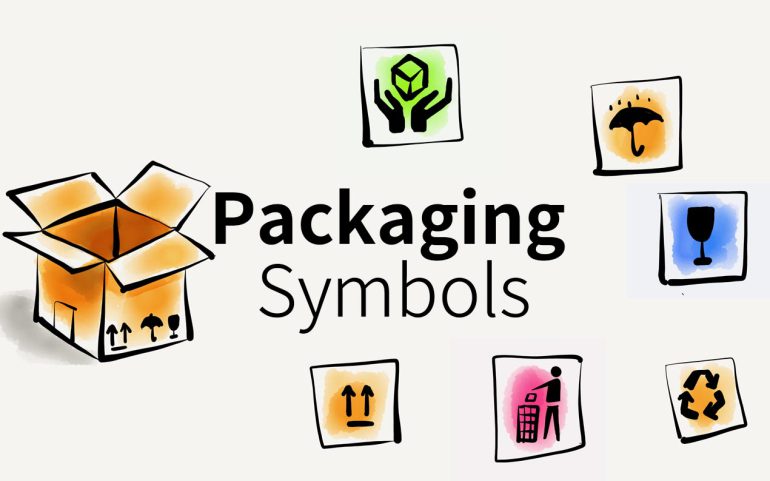Have you ever found yourself examining your package and pondering the meaning of all the symbols? One or more indications are always used on the box, regardless of whether you got the package or your consumer did. Packaging symbols are well known and provide information about the product inside in a clear and understandable manner. It is advisable to employ symbols that warn recipients or transporters of potential threats during transportation, even if using the majority of these packaging symbols on your boxes is entirely optional.
Although some packaging symbols are self-explanatory, we have produced a guide to assist you in understanding each symbol’s significance and how to utilize it when necessary.
A range of packaging symbols and icons to help protect your products in transit
packaging Symbols
Packaging symbols are vital to product identification. You will notice these packaging symbols on every product. Considering the increased understanding of customers, which is beneficial to how to manage those specific goods, packaging icons tell customers about the product and promote environmental claims.
The recycling of packaging by consumers is promoted by the use of unique emblems. Keeping this in mind, producers from all sectors of the industry are including information regarding recycling certifications on their packaging. Each sign has a distinct meaning and is easy to grasp.
Fragile (glass)
This emblem, which depicts shattered glass, is seen rather often. It is a warning that the items contained therein are delicate and, as a result, should be handled with extreme care to prevent breaking.
As a consequence of this, the parties engaged in the packing process are notified at every step of the process, whether it be storage, handling, or transport, and they take the required safeguards.
Related Article: Food Packaging; Everything About Food Packaging Industry

Keep Dry
The sign of an umbrella with raindrops on the packaging conveys the message that the box (and its contents) should be stored in a dry environment. There is also an alternative that shows just the umbrella that may be utilized.
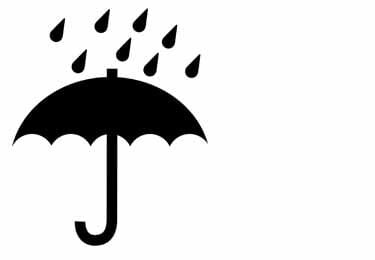
Handle with Care
This sign also indicates that the packaging has to be handled with care in order to prevent injuring the contents of the package. Products that come in packaging that bears this mark are not inherently fragile; nonetheless, it is important to avoid shaking them in certain circumstances, such as when dealing with pharmaceutical or electrical components.
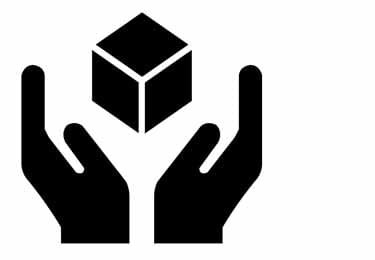
Related Article: Packaging Materials; Essential Information About Material In Packaging Industry
This Way Up
When the product is being stored or transported, the correct orientation of the package should be indicated by a horizontal line with two vertical arrows pointing upwards. It is possible to use this phrase in conjunction with the explicit words “This Way Up.”
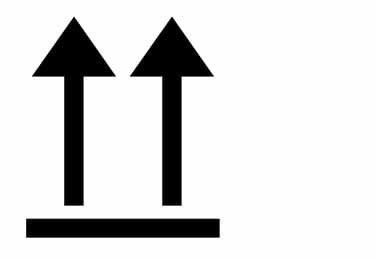
This side up
The individuals in charge of managing the packing are provided with a vital piece of information by this emblem, which depicts two arrows pointing in an upward direction. In order to protect the contents from being harmed, it instructs you to turn the package over so that the correct side is facing upward.
Temperature-sensitive
Depicting a thermometer, this sign is often featured on containers shipping foodstuffs or medicinal items that are sensitive to temperature changes. It states that the package must be maintained at a specified temperature so that the contents are not changed.

Related Article: Packaging Types; Everything You Want To Know
Protect from direct sunlight
From bulk purchases to tiny travel sizes, plastic bottles and various types of packaging are an important commodity. Some may also be utilized for decoration and aesthetic reasons, but as stated, these things, when placed under direct sunlight, may really be highly dangerous. “Packaging material may stimulate oxidation events in photosensitive items and lower their shelf life.”

Flammable materials
Products that are easily combustible and have the potential to ignite quickly will have a symbol of a flame on their package. Because of this, everyone who is going to be part of the trip should take special care to keep the package away from any sources of heat or fuel.

Do not hook
Use no hooks. Function/description: To signify that hooks must not be employed for handling the transport package. The primary applications are transportation package design and material management.

Do Not Open with Knife
When opening the box with a knife, there is a possibility that the contents may be harmed. The directions for the end user’s safety may be found inside this symbol. Examples include mattresses, books, and throw pillows.
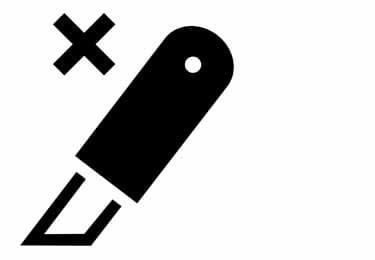
Do Not Place Near Magnets
There are several types of electronics and specialized equipment that are susceptible to being affected by magnetic fields. If this is the case, then people should be instructed to avoid placing the box near any magnets by using this image of a magnet.
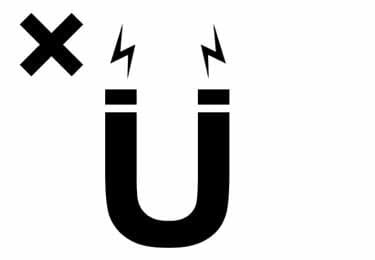
Do Not Drop
Despite the fact that this should be quite clear (surely it is preferable to not attempt to drop anything), this symbol might provide individuals handling your packing another hint that they should be careful while handling it.

Handling Instruction Symbols
The instructions for handling a package include all of the information that is required to carry it in the correct manner. Both the delivery employees and the clients need to pay attention to these guidelines. The following types of packing symbols are often seen on commercial items that are packed together in big numbers and sent together.
Symbols on packaging providing safety / handling instructions
The following packaging symbols are often used to demonstrate safe practices for handling, stacking, and storing. While there is some redundancy in terms of protecting the contents of the package, there is also some overlap in terms of safeguarding the package itself. In the same vein as the symbols described above, several permutations of them may be utilized appropriately (although bear in mind that too many icons can serve to confuse the user or cause important information to be overlooked).
Stacking Height
Instructions on how to stack the packages offer information that is important for their storage. These guidelines are very important in ensuring that the interior contents remain risk-free.

Load Weight / Height
Even robust packing has its limitations and can only sustain a certain amount of weight. Such products come with a stacking height recommendation. The symbol here denotes several things securely stacked up to a particular maximum. Here, the number in the center represents the maximum permissible stacking height. Examples: Milk and juice cartons

Do Not Stack
Users are instructed not to stack the boxes of packing by looking at a symbol that depicts stacked boxes of packaging next to a cross (or occasionally with the cross superimposed over the primary graphic).
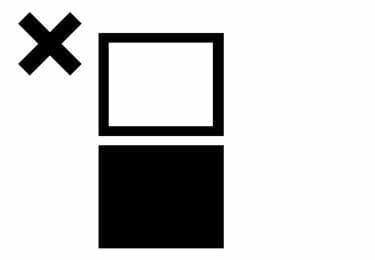
Contents Weight
The weight of the product is shown by a weight symbol on the package (including contents). Users will be able to determine how to handle the packing in the most effective manner, as well as the boxes they need (if there are several types) if this option is provided. The value of the number contained inside the symbol may be altered as necessary.
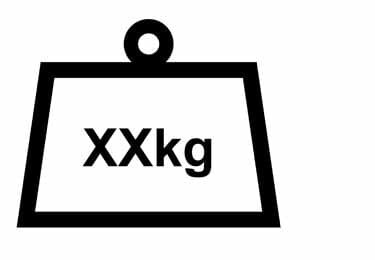
2 Person Lift
Rather than providing a weight indicator, two people lifting a box might convey that it is too heavy for a single person to carry.
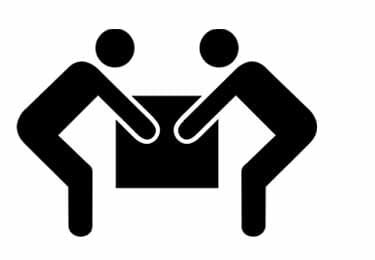
Heavy
Along the same lines as the previous sign, this one on the packaging warns people to exercise caution while lifting the box or packing owing to the hefty contents and/or the huge size of the item within.
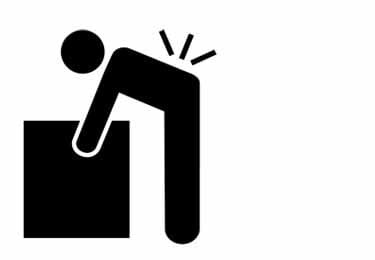
Do not lift
The “do not lift” indication is often seen on parcels that are extremely burdensome to carry. This sign is especially helpful for little packages that fool you into thinking they are heavier than they really are.
Scope
If you see a single individual attempting to raise a box that has a “Do Not Handle” sign on it, this is a signal that the box may be too heavy for one person to lift on their own. It’s possible that you’ll require a cart or the assistance of another individual. Be on the lookout for any of these symbols, which are seen below.
Trolley lifting
This sign is used for things that are considered to be cumbersome and difficult to transport by hand, even when there are numerous persons present. It is extremely suggested that you use either weight lifters or trolleys for these types of shipments.
Use Pallet Truck
The user is given a visual cue in the shape of a sign depicting a sack or pallet truck with stacked boxes on it to suggest that this sort of help should be used to carry many goods at the same time.

Do Not Use Sack Truck
On the other hand, this sign denotes that a sack truck should not be used to carry both the contents of this container as well as the packing itself (as doing so may damage the items within)
Do Not Use Forklift
Last but not least, a picture of a forklift with a cross over it or a line through it denotes that the container or its contents should not be transported by a forklift.
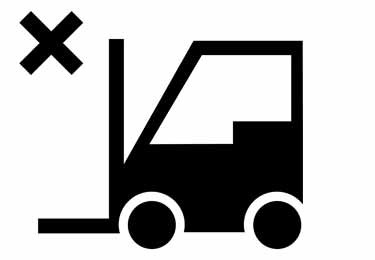
Do Not Use Pallet Truck
The user is given a visual cue in the shape of a sign depicting a sack or pallet truck with stacked boxes on it to suggest that this sort of help should be used to carry many goods at the same time.
Miscellaneous Packaging Symbols
Although there are certain symbols that are straightforward and simple to comprehend, there are also many others that are somewhat more puzzling.
Other frequently used cardboard packaging symbols
In addition to the corrugated transit packaging symbols used for handling, safety, and protection, there are a number of additional icons that may still be seen on corrugated packaging.
Caution (general)
The warning sign that consists of an exclamation point inside of a triangle is often used. As a result of the fact that this may be used in a wide variety of contexts, it is often qualified with some elaborative material following.
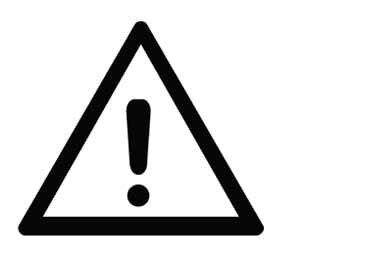
ESD Logo
This sign denotes that the container is ESD-safe, which means that it prevents electrostatic discharge onto the contents of the package. It is often found on anti-static packaging like the Corstat series, for example.
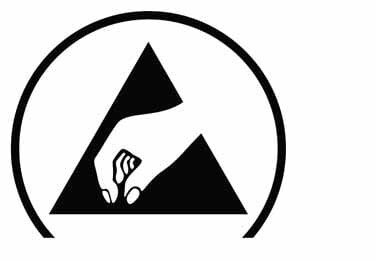
Food Safe
This mark indicates that the material used for packing food is suitable for use in that capacity. Food safety is a marketing term used by manufacturers and is not regulated in the majority of nations. Examples: Fruits & Vegetables.

Kite mark
The “Kite mark” logo, which is a trademark owned by the British Standards Institute and has the appearance of a kite, serves to denote that the product contained within the packaging satisfies certain criteria. It should be noted that authorization is necessary before use.
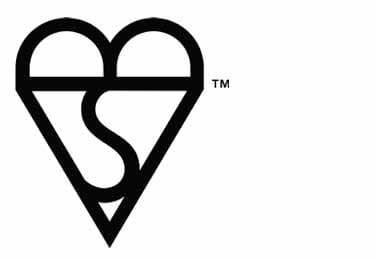
CE Mark
CE stands for conformité européenne (European conformity). In order to have this emblem on their packaging, products must be in accordance with the health and safety regulations of Europe. If you use the CE mark without the company’s authorization, you might face legal repercussions.
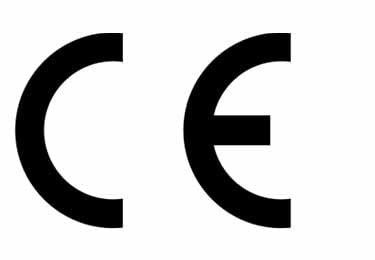
Food product symbols
The Non-GMO Project seal serves as a guarantee that the item in question was produced in a facility that prohibits the use of any genetically modified organisms (GMOs). Genetically modified organisms, sometimes known as “GMOs,” are living things whose genetic material has been modified in a laboratory by means of genetic engineering. This process results in the creation of combinations of plant and animal genes that are not found in nature. Products originating in the United States of America or Canada may benefit from the independent verification of testing and GMO regulations provided by the Non-GMO Project.
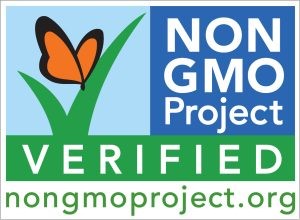
Figure 25: A symbol for food product symbols
Gluten Free
The Gluten Free Certification Organization (GFCO) designed this emblem to ensure that the food contained inside the container does not contain any traces of gluten and that the product was not subjected to any kind of cross-contamination.
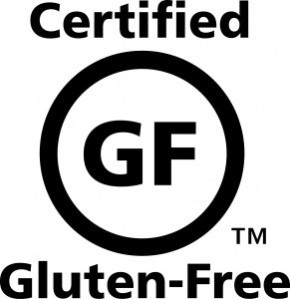
Figure 26: A symbol for gluten free
Vegetarian
In accordance with the legislation, food that is vegetarian shall be denoted with a green sign, whereas food that is not vegetarian should be denoted by a brown symbol.
Vegan
As a direct reaction to the rising number of customers who are interested in purchasing vegan goods, this logo has been introduced to the packaging of such items. Products that bear this designation have been checked and proven to contain no animal products or byproducts of any kind.

Compostable
Another certification mark to watch out for is the “compostable” certification label, which is issued by the Biodegradable Products Institute and the United States Composting Council. There are several different iterations of this term floating around out there. Each of these symbols denotes that the polymers used are in compliance with the ASTM requirements D6400 or D6868 for USCC-BPI biodegradable compostable goods, as tested and verified by ASTM International, an organization that establishes standards.
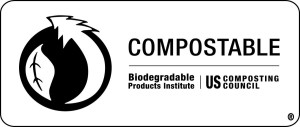
Home Compostable
Vincotte OK compostable home logo There aren’t many types of biodegradable plastics that are suitable for home composters to use in their backyard compost piles. In fact, the majority of municipal and commercial composting facilities do not have the capacity to process so-called “compostable” plastics since their composting processes are not up to the task. Only a small fraction of the over 5,000 composting facilities in the United States make use of the strong and high-rate technology that is necessary.
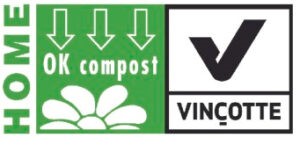
Recycling Symbols
The inclusion of recycling specifics is voluntary and not required by any governing body, although it is very much appreciated. These international markings for packaging apply to both the items contained inside a package as well as the cardboard boxes that it comes in.
Recycling symbols commonly used on corrugated cardboard boxes
The recycling symbols that are shown below are those that are most often seen on corrugated packaging. This guide to recycling symbols on packaging has a more extensive list encompassing all of the icons and emblems that may be used to signify recyclability (and recycled content).
Mobius Loop
The Mobius loop is one of the recycling symbols that signifies that the product or packaging may be recycled. It is perhaps the symbol that is used and recognized the most. It is also possible to show it with a symbol representing a percentage in the center of the icon.
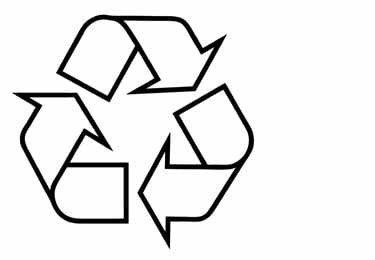
FSC
The term “FSC®” stands for the Forest Stewardship Council, and items bearing this label on their packaging have been verified as containing timber from responsibly managed forests. It is necessary to get authorization or accreditation in order to use this emblem.
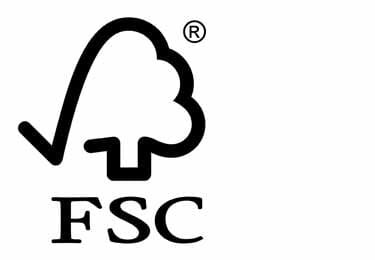
Tidy man
This emblem is meant to serve as a friendly reminder that you should dispose of the package in an appropriate manner. The tidy guy is a readily recognizable emblem in the United Kingdom, but in other nations, some may find it out of place.
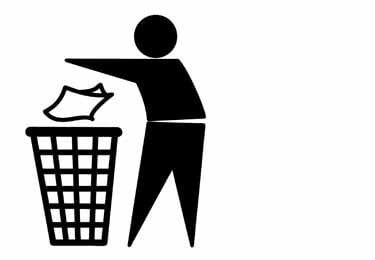
Corrugated Recycles
The Corrugated Case Association has created a symbol called the “Corrugated Recycling Logo” that anybody is allowed to use. This symbol was designed to bring attention to the fact that cardboard packaging can be recycled.
Green Dot
The presence of the green dot does not indicate that the product’s packaging is either recyclable or recycled. It is evidence that the manufacturer has made a financial contribution to the packaging’s recovery and recycling efforts.

Plastic recycling
The recycling symbol for plastic is a reference that will assist you in determining the type of plastic material that was used in the production of your goods. A straightforward table illustrating the various symbols and the information that corresponds to them is provided below.
1 – Recycling PET or PETE (polyethylene terephthalate)
Containers for Mouthwash and Rinse, Mouthwash Bottles, and Water Bottles
2 – Recycling HDPE (High-Density Polyethylene)
Containers for milk and juice, as well as plastic bags and bottles of shampoo
3 – PVC (Vinyl or Polyvinyl Chloride)
Drain Pipes, Automotive Interiors, and Medical Devices are Some of the Products We Offer.
4 – LDPE (Low-Density Polyethylene)
Toothpaste Tubes, Furniture, and Food Bags That Can Be Stored in the Freezer
5 – PP (Polypropylene)
Bottle Tops, Straws, and Various Kinds of Medicinal Containers
6 – PS (Polystyrene)
Cups, plates, egg cartons, and take-out containers are made of disposable materials.
7 – Other Plastic Types
products made of CDs, DVDs, sunglasses, and nylon
Conclusion
Packaging symbols identify products. Symbols abound. These symbols disclose product information without disclosing package contents. There is a range of symbols and icons to help protect your products in transit.

